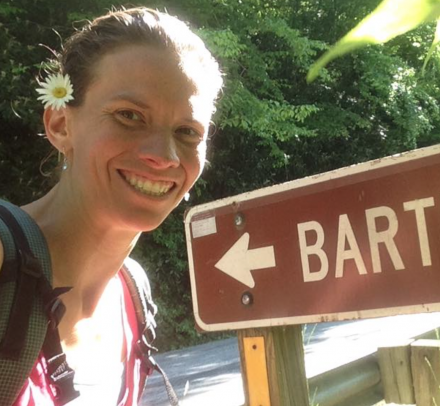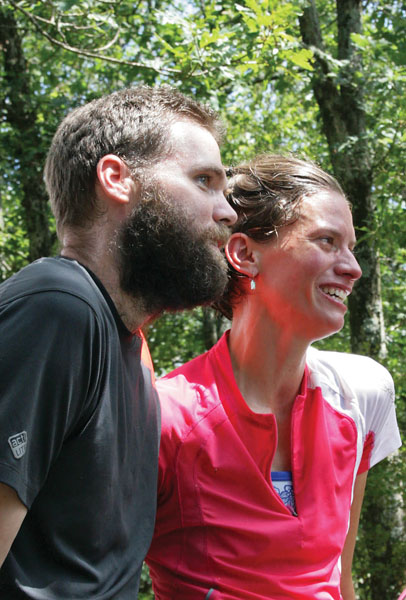On just the 12th day of her record-attempting Appalachian Trail hike, with over 1,650 miles remaining, Jennifer Pharr Davis was broken down, depleted, and ready to give up. Perhaps the most disabling combination for a hiker—shin-splints and diarrhea—had been wreaking havoc on her body for the last four days. Negative thoughts and fear were poisoning her mind. “It was the perfect storm,” says Pharr Davis. “I was already way off pace and thought ‘there is no way I can get the record.’ I gave up.” She approached a juncture on New Hampshire roads where she was meeting her husband Brew, who was supporting the hike. She was sad to quit, but relieved to be done.
The buildup to that juncture started seven years back when Jennifer was 21. Upon finishing college it struck her that her traditional education “happened in a box.” She knew nothing about the environment, and sensed that something central to her human experience was missing. She longed to connect with nature.
So Pharr Davis set out on the Appalachian Trail for the first time. The experience taught her far more than rudimentary backpacking skills. “I met wonderful companions and felt indescribable awe,” she says. “I learned to prioritize people and experiences over stuff.”
But perhaps more than anything, Jennifer connected with nature in a visceral way. “I discovered nature was not separate from me, but that I could be a part of nature, flowing with it.” Pharr Davis says she felt closest to God while on the trail. “I realized that maybe my gift is an ability to move swiftly in the wilderness. As a Christian, I felt obligated to use that gift.”
And use that gift she did. Just a few years later in 2008, with more training under her belt and the support both on and off the trail of her new husband, Jennifer hiked the Appalachian Trail in 57 days. It marked the fastest-known time ever for a woman. By then, hiking had become an integral part of Jennifer’s life. She started to think, “Maybe I could break the overall record.”
The overall record stood at 47 and 1/2 days and had been held by a long line of competitive male athletes who specialized in ultra-endurance events. Although Jennifer’s breaking the overall record would be akin to a woman beating all the professional men at the Boston Marathon (i.e., unthinkable), she had unshakeable self-belief, and the backing of Brew. They devoted themselves to going for it, dedicating the next three years of their lives to training and preparation.
Fast forward to June 28, 2011, when Jennifer’s drive and chances of breaking the overall record came to a crippling halt as she approached Brew on those New Hampshire roads. “I finally got to Brew and told him I was quitting,” she says, but “Brew was not okay with it.” Brew reminded Jen that he had given up so much of himself for her, and that this was a team effort. It was only then, looking into her husband’s eyes, that Jennifer realized, “Until then, everything had been about me and the record. I was a slave to the record, it was all I was thinking about.” At that point, Pharr Davis had a revelation that changed everything:
“I just totally released from the record. I started hiking out of a greater faith. I wanted to honor my God, to get back to the reasons that got me hooked on hiking to begin with—a love for the wilderness, a love for my husband, and to use my gift. I remembered that I feel closest to God when I am hiking up and down the trail as a part of nature, when I am loving my husband, when I am relishing in my gift. All of a sudden, the hike was no longer about a record, it was no longer about me. The whole thing became an act of worship to something greater than myself.”
Although her physical discomfort ebbed and flowed throughout the hike, after that paradigm shift, Jennifer’s psychological distress evaporated. She quickly ascended from a very dark place.
Thirty-four days later, after averaging over 47 miles per day, Jennifer had accomplished the impossible and shattered the overall record by 26-hours, a feat that earned her the title of National Geographic Adventurer of the Year. (Note: As of print, Jennifer’s record still stands. Scott Jurek, one of the world’s most heralded ultra-runners and a key character in Christopher McDougall’s hit book Born to Run set out to break the record in late May of this year.)
Purpose as a Performance Enhancer
I shared Jennifer’s story with University of Michigan professor Dr. Victor Strecher who studies the role of purpose in our lives and who is known for his expressive, articulate nature. He responded with an unusually short email: “Wow.”
Dr. Strecher’s research shows that when people focus on their core values and a self-transcending purpose (a purpose greater than themselves), they become capable of more than they ever thought was possible. In a somewhat ironic twist, according to Strecher, “The less you think about yourself, the better you are likely to become.”
Strecher says that when we concentrate on something beyond ourselves, our ego is minimized. This is important because a large part of our ego’s role is to quite literally protect our “self,” telling us to shut down or flee when faced with threats. When our ego is minimized, so too are the fears and anxieties that often hold us back from major breakthroughs. Liberated from our ego, a whole new realm of possibilities opens up. Jennifer Pharr Davis’s experience on the Appalachian Trail is a profound example of this phenomenon.
What’s more is that emerging science is starting to show us what might have been happening in Pharr Davis’s brain during her memorable mindset shift on the trail. For a recent study published in the Proceedings of the National Academy of Sciences, “Self-Affirmation Alters the Brain’s Response to Health Messages and Subsequent Behavior Change,” researchers including Strecher used fMRI technology (allowing them to look at neural activity in the brain) to examine what happens when people are presented with threatening messages. Sure enough, individuals who were asked to reflect deeply on their core values prior to receiving a threatening message showed heightened neural activity in a part of the brain associated with “positive valuation.” In other words, their underlying neurology became more receptive to an otherwise threatening situation.
It is also worth noting that the effects were not confined solely to the brain. The individuals who reflected on their core values actually went on to overcome threats and fear in real life at a much greater rate than a control group.
Purpose is extremely powerful when it comes to being your best.
What Jennifer Pharr Davis accomplished physically on the Appalachian Trail is extraordinary, and undoubtedly takes a gift that lies at least partially in genetics. But what she did psychologically is no less remarkable, and is accessible to us all. By shifting our orientation from focusing on ourselves to focusing on something greater than ourselves, we become more likely to reach new heights. Whether that greater purpose is religion, family, friends, charity, or something else entirely doesn’t much matter. What does matter is releasing from our ego. Going beyond our own little world. Transcending our self.









